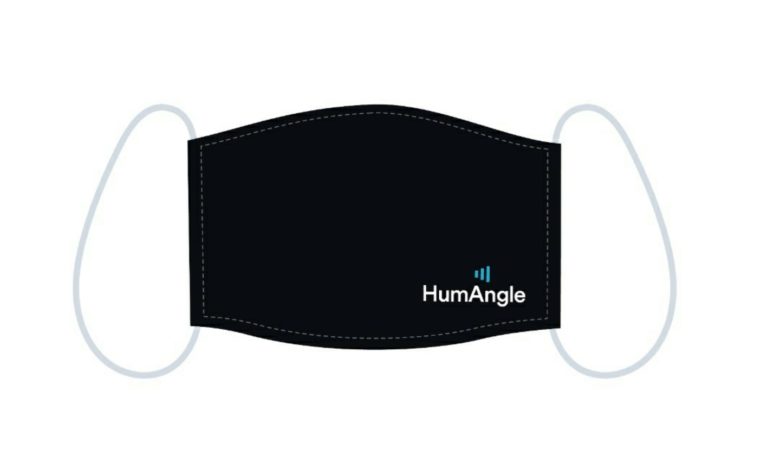Wearing Face Masks Removes Deaf Nigerians From Communication
The use of face masks is important to reduce the spread of COVID-19 but it cuts off communication access for members of the deaf or hard-of-hearing community. Richard Olabamidele Ezekiel shares his experience with Nigerian banks on the issue.

Richard Ezekiel is hearing-impaired and struggles to navigate transactions in Nigerian banks because of face masks. Like most deaf and hearing-impaired people, he lip-reads to better communicate with other people.
On Twitter, he called out Nigerian banks for failing to provide other communication channels for deaf people, especially with the struggles face masks present for them.
He wrote, “Dear Nigerian Banks, I am a deaf Nigerian customer of some of you and therefore thought, after all my ordeals at your branch[es], to bring your attention to some ills and offer practical solutions especially in this time of the global pandemic. It is no news that a lot of us deaf [people] depends on lip-reading when we find ourselves in an environment that is not inclusive.”
To reduce the spread of COVID-19, people are expected to wash their hands regularly, maintain social distancing and wear face masks. While the latter has proven effective in curtailing the pandemic, it restricts communication access for members of the deaf or hard-of-hearing community.
For a lot of deaf people, lip reading is crucial. They watch the lip movements of the people they are communicating with and read body language as well, to infer what they are saying.
Since the pandemic started and face masks became compulsory, this channel of communication has suffered greatly, increasing the difficulties with which deaf people navigate daily interactions.
Ezekiel described the environment and staff at Banks as generally insensitive and non-inclusive.
“An example is calling names by security staff based on first-come-first-serve. How do you expect someone who depends on lipreading to cope? How do you expect us to “hear” the instructions given outside and inside the banks when our own ears are actually our eyes? How do you want us to interact inside the banks without a sign language interpreter?” he asked.
Ezekiel’s thread has received solidarity from a lot of people, with other members of the deaf community agreeing with his struggles. His narration spotlights a problem that is easily ignored in the Nigerian society.
The United Nations (UN), in 2018, reported that 25.5 million are Nigerians living with disabilities. 9.5 million of that number are deaf. Although the rights of deaf persons have been adequately provided for under the United Nations Convention on the Rights of Persons with Disabilities, they still suffer marginalisation which has been heightened by COVID-19.
Article two of the Convention clearly recognises sign language as a language of deaf persons. In this regard, state parties are enjoined, under article 21, to encourage freedom of expression and opinion, and access to information, to recognise and promote the use of sign languages.
Nigeria does not have a recognisable sign language given official recognition by law for deaf persons in the country.
“Nonetheless, with reference to article 21 of the Convention, which Nigeria has signed and ratified, there is a lot that can be done to mainstream deaf persons into society. First of all, all information provided to the general public should be made available to deaf persons in an accessible format, timely and without additional cost,” Julius Shemang, of the African Deaf Initiative (ADI), wrote.
What are the solutions during COVID-19?
The absence of an official sign language could make it difficult for banks and other public service spaces to implement one of the solutions proposed by Ezekiel. In the thread, he wrote that staff, fluent in sign language, should be employed. This is important and would require intentional training on the part of organisations.
He also highlighted other solutions that could be adopted. They include the use of queue number machines and the use of text through whiteboards. On the former, he said, “queue number machines can work for all and sundry. It allows room for social distancing too and helps people know their exact number without the risk of borrowing pens and jumping lines in the name of ‘I was here before you’.”
For text, he said, “The use of text on a screen or a whiteboard is also preferable. Let it be on record that a lot of deaf people park their cars outside and a situation whereby security is trying to get someone to come and move his car and the person is not hearing the instructions, an on-screen text or whiteboard announcement can suffice because deafness got levels and just because someone is mute doesn’t mean they are the only category of Deaf available.”
The issue, faced by deaf people during COVID-19, is not limited to Nigeria. The alarm has been raised in several countries and has partly inspired the production of clear masks so deaf people can lip-read.

The issue with clear masks, however, is that while they have proved helpful for deaf people, they fog up easily and can muffle speech.
For these masks to be effective, staff of public service spaces should be required to wear them to enable deaf and hard-of-hearing people to communicate better with them. And this is the barest minimum they could do.
Support Our Journalism
There are millions of ordinary people affected by conflict in Africa whose stories are missing in the mainstream media. HumAngle is determined to tell those challenging and under-reported stories, hoping that the people impacted by these conflicts will find the safety and security they deserve.
To ensure that we continue to provide public service coverage, we have a small favour to ask you. We want you to be part of our journalistic endeavour by contributing a token to us.
Your donation will further promote a robust, free, and independent media.
Donate HereStay Closer To The Stories That Matter




